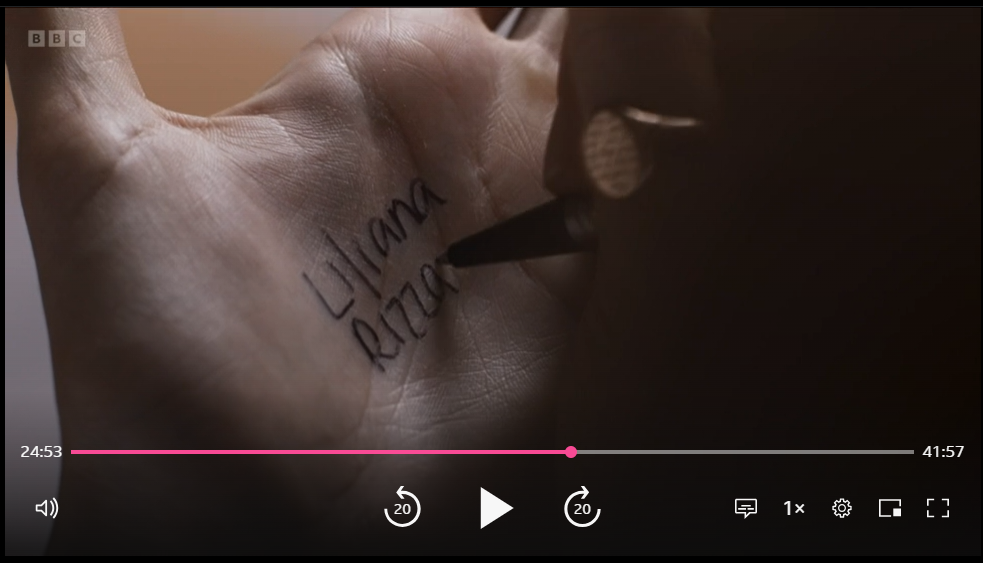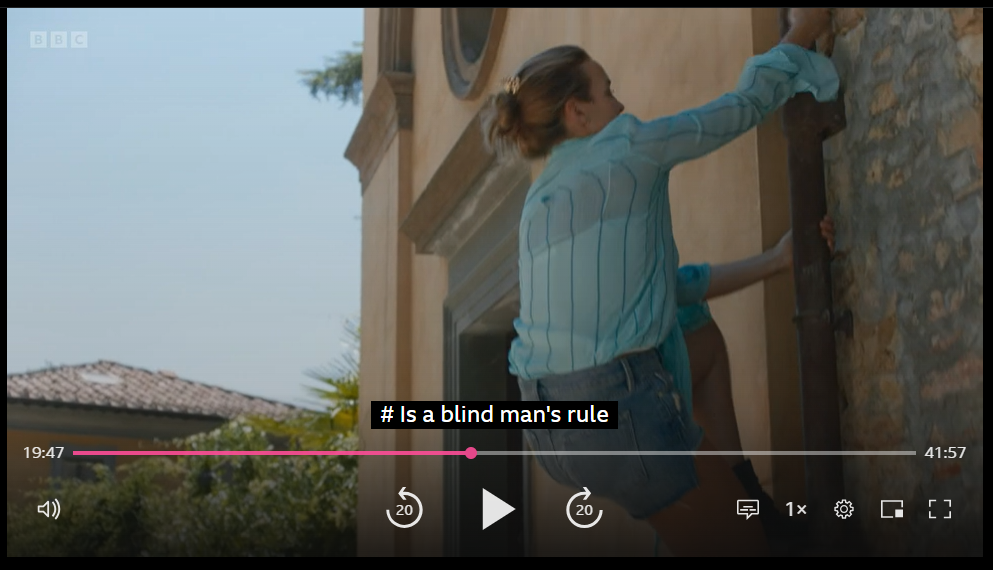TV Drama Revision
KILLING EVE:
Narrative:
Split narrative:
Narrative 1: following the protagonist 'Eve' as she tries to find out who the assassin is (Villanelle),
Narrative 2: we see Villanelle's murders so we know before Eve does - omniscient audience?
both narratives are connected to each other
Characters:
Villanelle: Antagonist, Female, Russian, Cruel - knocks ice cream onto child, Unhelpful - doesn't help the older lady (possibly joking/friendly?) Dark sense of humour - playing dead when her boss comes to her apartment. Middle class = Consumerism culture - many shopping bags, apartment in the centre of Paris. Intelligent - able to get away with her assassinations
Eve: Protagonist, Female, Asian, Married, works for MI5, Not happy/not attracted to her husband, Obsession/Attraction to female assassins. Middle Class - owns a nice house with her husband, works for MI5. Intelligent - working for MI5.
Elena: Female, Black, younger, Eve's assistant at MI5.
Bill: Male, Caucasian, older, Eve's Boss at MI5, Friendly with Eve - sharing food. Sides with Eve when Frank fires her, gets fired himself.
Frank: Male, Caucasian, Older, Bill's Boss at MI5, suspicious character - hiding evidence/lying about evidence.
Carolyn: Female, Caucasian, Older. Head of Russia desk. At the end she offers Eve a job, alongside Elena and Bill, in helping to stop Villanelle.
Konstantine(?): male, Russian, older, Villanelle's boss. Controlling, darker sense of humor.
Niko: Male, Eve's Husband, Polish, older, helpful to eve (translating the interview with Kasha)
Dominik: Male, Teenager, polish,, young - teen. Helps eve (translating the interview with Kasha, Accompanying eve to the hospital)
Kasha: female, Polish, young. The only lead Eve has on finding out anything about villanelle and her assassination(s).
Events:
Ice cream shop scene - this is our first meeting with villanelle. we are able to see that she lacks social skills as she only smiles at the child after the man running the shop smiles. We can see through the mise-en-scene of her facial expression that the smile is insincere. Next, we see her look down and wipe blood/Ice-cream off of he watch. This use of mise-en-scene is foreshadowing for the later events in the episode. We then see Villanelle's cruelness as she knocks the ice-cream onto the young girl as she is leaving. This juxtaposes the normally good feelings surrounding ice-cream with the cruelness of her actions.
Villanelles Assassinations -
Each Assassination becomes more and more violent throughout the episode.
The first assassination - Meeting scene : done off-screen, and is done to a politician who is known to traffic women. Due to the vileness of the character and his actions, as well as us not seeing the assassination happen, it is not exactly seen as a violent assassination. We are able to hear this through the use of sound in the dialogue from the discussions between Carolyn, Bill, Frank and Eve at the MI5 meeting.
The second assassination - Tuscany Scene: done to a mafia boss, who touches villanelles face without her consent. This assassination is more violent, as we see her stabbing the man with a poisoned hairpin in his face. She also takes the time to write down the name of a designer on her hand (presumable to buy from) which shows her lack of empathy or emotion in general.
The third assassination - Hospital Scene: Here we see Villanelle's most violent point. Whilst eve is on the phone to Bill in the toilet, Villanelle manages to sneak in and murder an entire room of hospital staff as well as Eve's only witness - Kasha
Context:
[Historical] [Political] [Social] [Cultural] [Economic]
Cold war - Russia is demonised through Konstantine and Villanelle as antagonists, villanelle as an assassin
Salisbury poisonings - Villanelle using a poisoned hairpin in an assassination.
Trump elected as president - Donald Trump is known for his bigotry towards anyone who is LGBTQ, Female, Non-white. Eve is Asian, Female - strong, determined lead character. Villanelle is Russian, Female - strong, skilled, intelligent.
Saudi Arabia - Strong, Intelligent, female lead characters
#metoo - Eve as a powerful, confident lead character. Villanelle as strong, intelligent, powerful.
Multiculturalism - Range of ethnicities in Killing Eve - Asian, Polish, Black, White,
MI5/Secret Services - Every country has a secret service group, universal context
Use of Star vehicles - Eve played by Sandra Oh - famous american/asian actor.
Gender:
Villanelle:
conforming to gender stereotypes:
Paris Scene:
Mise-En-Scene: holding multiple shopping bags - presumable expensive brands.
Feminine Clothing: Beige coat
Tuscany Scene:
Mise-en-Scene: Feminine shirt - slightly see through - light blue. Hair Tied up into a bun. Wearing gold earrings.
Changes into a light blue dress with lace - feminine, traditional stereotypes of women caring about their appearance.
Writes down the name of the designer - passion for consumerism
Villanelle Subverting Stereotypes:
Her job as an assassin converts stereotypes - violent, unsympathetic, cruel.
Tuscany Scene:
Riding a bike - traditionally masculine thing.Patriotism:
Ethnicity:
Masculinity:
Final Question:
LUPIN:
Following Assane Diop. Assane is seeking revenge after his father was falsely accused of stealing the Marie Antionette neckless. Working as a cleaner at the Louvre. Assane is not close with his son, paying child support to his ex-wife. Goes to the gang: Kevin, Rudy, Vincent, for money - they are loan sharks. Assane Convinces gang to help steal the neckless in order to pay off his debt. Plans out the heist. Assane is bidding at the auctions whilst the gang attempt to sneak in - Gang are failing to chloroform guards. Assane steals the neckless by placing it in the bin and Switches it with a fake one, The gang take the fake one. The gang crash their car and are arrested. When Assane is back as a cleaner he takes the bin with the neckless in and places the neckless at the bottom of a bin bag to steal it. It is revealed that Assane was pretending to be lower class and actually lives a quite lavish life in the center of Paris.
Narrative in the flashbacks: young Assane & his Father: Babakar. Babakar is a chauffer and works for the Pelligrini family. He is allowed to take a book for Assane and chooses Gentleman Burglar. Babakar is then accused of stealing the Marie Antionette neckless. Babakar 'commits suicide' in prison. Assane meets Juliette Pellegrini.
Characters:.
Assane - Black, Higher class pretending to be lower class
Babakar - Black, Lower Class, Immigrant from Senegal, works as a chauffer, Falsely accused of being a criminal.
Juliette - White, French, Racist towards Assane, Sexualised
Mr & Mrs Pellegrini - White, French, Racist towards Babakar & Assane
The Gang: Kevin, Rudy, Vincent - White, Unintelligent, Lower class, Loan Sharks.
Events:
Meeting the Gang - See the Banlieu's, Physically less colour - no greenery, large towering & dirty buildings. High Camera Angle - see the extent of the poverty. Gang are aggressive, playing video games, unintelligent loan sharks - stereotypes of the lower class.
Babakar accused of stealing neckless - Racism in French society. Police refusing to let Babakar tell his side of the story, immediately believes Mr Pellegrini.
Auction Scene - Racism in french society - "I didn't expect someone like you" + "young". "young" as a cover up - seemed slightly panicked when saying it. Auction goers wearing suits - stereotypical of higher class. Cleaners physically lower than the buyers - cleaners underground & unable to be seen by the higher class - treatment of lower class in society = invisible, not wanted to be seen.
Context:
[Historical] [Political] [Social] [Cultural] [Economic]
Banlieues - poorer area of large cities in France. 80% of Paris lives in them
Immigration Laws - Right wing, French, Political parties passed anti-immigration laws.
Majority White population in France
Gender
Female:
Majority of Female characters are not named & receive very little screen time
Assane's Ex Wife - White, Unnamed, getting child support from him - requires his assistance. Portrays women as needing support and helpless.
Worker who give's Assane the job as cleaner - Black, Unnamed, receives very little screen time. Assane manipulates her by discussing shared experience of being from Senegal.
Juliette Pellegrini - Sexualised for the Male Gaze. Kisses Assane - wearing bathing suit, looks attractive. Cares about her appearance - stereotypes of women.
Various representations of men throughout the episode.
Babakar - Gentlemanly, kind
Assane - Cunning, intelligent
The Gang - brawny, unintelligent, aggressive
Mr Pellegrini - Racist, Aggressive, controlling.
Social Class
Lower class:
Physically positioned lower than the higher class. Cleaners underground vs bidders above ground in the louvre. Represented as unimportant
The gang represented as unintelligent - heist scene: failed to make working chloroform, their part of the plan doesn't work, Rudy gets a too small & loud get away car - Vincent can barely fit in it, crashes car into the louvre skylight and lands in front of Police. Represented as comedic.
Higher class:
Physically positioned higher than the lower class.
Wearing suits - associated with being rich & upper class. Bidding at auctions - consumerism - associations with the upper class.
Assane - revealed to be upper class at the end. Lives in a nice house in inner Paris. Has many suits.
Ethnicity
History & Culture
Age
Key Representations
Context:
Cold war - Russia is demonised through Konstantine and Villanelle as antagonists, villanelle as an assassin. Salisbury poisonings - Villanelle using a poisoned hairpin in an assassination.
Trump elected as president - Donald Trump is known for his bigotry towards anyone who is LGBTQ, Female, Non-white. Eve is Asian, Female - strong, determined lead character. Villanelle is Russian, Female - strong, skilled, intelligent. Saudi Arabia - Strong, Intelligent, female lead characters
#metoo movement - Eve as a powerful, confident lead character. Villanelle as strong, intelligent, powerful. Multiculturalism - Range of ethnicities in Killing Eve - Asian, Polish, Black, White,
MI5/Secret Services - Every country has a secret service group, universal context
Use of Star vehicles - Eve played by Sandra Oh - famous american/asian actor.
LP:
Context:
An economic context that is found in Lupin is the use of the Banlieues, which are poorer area of large cities in France. They are usually quite delapidated with towering apartments & 80% of Paris lives in them. We can see this in the scene where Assane meets the gang in their apartment.
A political context that affected the production of Lupin is the Immigration Laws brought in by the French government. This was also reinforced by the rise of right wing political parties in France. We can see this through the way that Assane and Babakar are treated throughout Lupin.
A cultural context that is found in Lupin is the Majority white population living in France. We can see this in the Auction scene, as Assane is one of the very few black people in the auction hall.













Comments
Post a Comment